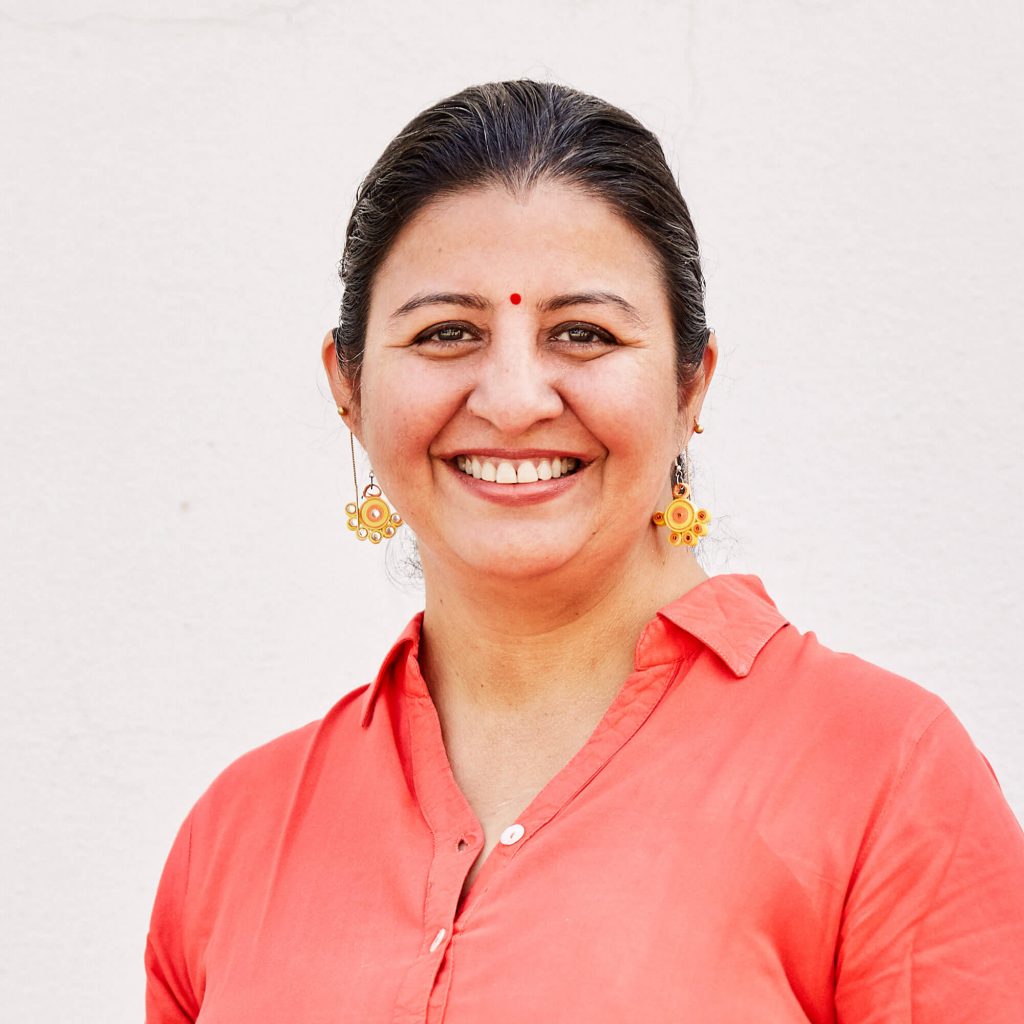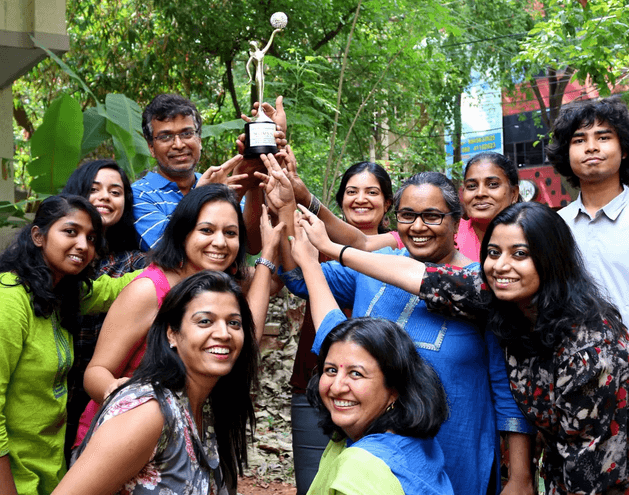
By Chandrima Mazumdar
From working in IT to becoming a champion of sustainable environment, Sarjapur Road resident Malini Parmar’s life is nothing short of an inspiration. The co-founder of Stonesoup is also part of the Solid Waste Management Round Table (SWMRT), 2bin1bag campaign (waste segregation), Bangalore Eco team (known for its campaign against plastic), Swacchagraha (composting) and Green The Red (sustainable menstruation) initiatives aimed at sustainable living. In her previous avatar, she worked in IT and BPO firms as CMO, CSO and CSR head, where her work spanned 25 countries and 17 years.
What motivated her
Parmar says that there were two distinct incidents which motivated her on this journey. Initially, she had become a waste volunteer to help a friend, which changed when she started observing waste all around. On the way to work, there was a garbage burning spot. Every time there was burning, her daughter would have a breathing problem a day or two later. “She took medicines and consulted doctors,” recalls the IIM Kolkata alumni. “But this isn’t how you would want your daughter to live. I later found that the garbage was dumped by communities like mine! When villages around Bangalore protest about receiving garbage, it gets burnt.”
Around the same time, a fellow eco volunteer went to a village near Mandur where she witnessed kids with sores on their bodies from which pus was oozing out. On consulting doctors, they found that this condition happened when the toxicity in the body was too high; the body then opens up the skin to let out the toxins. “We realized that we couldn’t do it to children, irrespective of their socio economic background. That is when I transformed from a volunteer to an activist,” says Parmar, whose firm was one of the five Indian startups to be shortlisted for the Global SEED low-carbon awards in 2019.
Accidental entrepreneur
Parmar, born in Punjab but staying in Bengaluru since 2001, calls herself an accidental entrepreneur. Earlier, her prime focus was to make sure that the waste she and her community was generating is handled responsibly. Her friend suggested that they segregate their waste. After talking to people around her, her group found that contrary to what they had thought earlier, the majority of the people were keen on garbage segregation but didn’t know of any systems and processes. “Given that we had decades of corporate training, we started to implement various methods,” recalls Parmar who graduated in civil engineering from the Delhi College of Engineering. “More people started adopting it, and soon spread through different communities.” Even before the government rules became operational, there were 50,000 households segregating their waste due to the volunteers’ efforts in 2011. Today, segregation at source is the norm.
Solid Waste Management Round Table (SWMRT)
In 2008, before Parmar became active with waste management, there were a few citizens in Bangalore who used to do little things for the environment in their neighbourhoods. Later, they came together and started meeting every Tuesday to exchange ideas and SWMRT was born. In 2011, when Parmar and her community were looking for ways to segregate waste effectively, Google came to their rescue. NS Ramakanth, fondly called Anna Hasiru, who has dedicated a major part of his life fighting for a cleaner Bengaluru, educated Parmar and her friends. “Ramakanth sir had bought a vendor who was willing to take segregated waste, and someone from the municipality office who helped in getting the garbage contractor to align with segregated waste pickups,” reminisces Parmar. “In 2012, BBMP came up with its own segregation guidelines which were too complex.” Parmar and her friends in Bellandur were working together at the time as Kasa Muktha Bellandur, and they tried to simplify the guidelines. About 80% of the waste generated at home was kitchen waste which fell under wet waste. Other than that, there was dry waste, and the third part (which included sanitary pads) goes into a separate section called ‘reject’ waste. This is how the idea of ‘2bins1bag’ was born. “Once you put a pizza box in a garbage bin, there’s not much space for anything else,” says Parmar. “That is why we decided to use a bag for dry waste. Dry waste isn’t that heavy, so it could be easily handled.” Today, 2bins1bag has been adopted in Gurgaon, Pune, Kolkata, Sikkim, Ooty and several other places in the country.

From eco warriors to eco entrepreneurs
In 2014, Parmar took a year off from her IT job to volunteer in the area full time. That was when she found her calling. “At the end of the year, I realised there was more work to do in this space, than in IT,” she says. Parmar and her friends Meera N and Smita Kulkarni, who were part of the garbage volunteer team, started Stonesoup. Meera exited soon but many more from the Garbage Sisterhood joined: Bhavna, Nandhini, Rupal, Padma and Shantha.
People complicate the idea of sustainability. Says Parmar: “While looking for people to accept our sustainable way of living, we didn’t talk about nature solely. We tried to tell them how it is beneficial for them. For example, when we talked about menstrual cups, we told them that you could swim with it. While talking to them about organic food, we tell them how it is good for them. You take a big idea and break it into small pieces to make it easier for the people to grasp.”
About Stonesoup
Stonesoup is named after a parable where hungry travellers take an empty pot, a few stones and water to cook food. When the soup is tasted by the leader of the travelling group, excited villagers crowd around to partake of it. However, the leader says some items are missing and ends up getting the villagers to each contribute a food item that leads to a stomach-filling soup for the entire group. Similarly, Parmar’s Stonesoup offers sustainable, simple, and hassle-free segregation and composting solutions to households. The website is home to hundreds of sustainable everyday products. Parmar and her friends call themselves typical middle class working women who recognised the connection between their waste and the ailments suffered by their children. What started as a small venture soon turned them into a part of the nationwide Garbage Sisterhood.
“We need to look into our dustbins and see what it is that we are disposing of, what makes the bulk of it? What are the things that we are disposing off daily and how can we reduce it? The waste that we are discarding once every two or three years can be taken care of by the city,” says Parmar. While it is impossible to bring the waste production to zero, it is possible to reduce garbage significantly. Sanitary pads, disposable cutlery, and water bottles are the kind of wastes that can be reduced in quantity. “Menstrual cups last for more than ten years instead of the normal pads which are disposed of every eight hours,” she says. “Our viewpoint is to reduce garbage, and we think that that is more sustainable living.”
Other than the products and the thought that goes behind every product, Stonesoup also tries a sustainable approach for employment. Their products are made by women in non-metro cities, besides self-help groups and middle-aged women with child care responsibilities, among others. “Even for the factory-made things, we try to make them in India instead of importing them from China or any other country,” says Parmar. Stonesoup doesn’t want to be a centralised company. They try to partner with NGOs who can produce in every district. They look for non-profits who are ready to work with them. Besides they train the workers, and buy the finished products from them. Her organisation has coordinated with voluntary groups based in villages from Tamil Nadu, Karnataka, and Odisha, among others. “None of our manufacturing is inhouse, but our innovation is.”
Parmar does not believe in blaming communities. “We can’t blame people for not being educated about solid waste management,” she says. “There are enforcements that are required. Who educated the people one to one to stay at home during COVID-19? No one. There were hard rules formulated and implemented with firm oversight from the government officials. That is what is required in garbage management too. Finally, Bangalore has a good set of rules, from plastic ban to segregation at source, and we just have to enforce them.”
It has been a fun journey so far. “IT used to pay me more, and I could go to new places outside India,” says Parmar. “However, meeting like-minded activists, motivating people, and visiting different parts of my city, and working with them towards a cleaner and better city is more soul-satisfying.” When she’s not advocating sustainable living, Parmar loves travelling and reading books.
We wish Parmar and her team, the very best in all their social endeavours.



